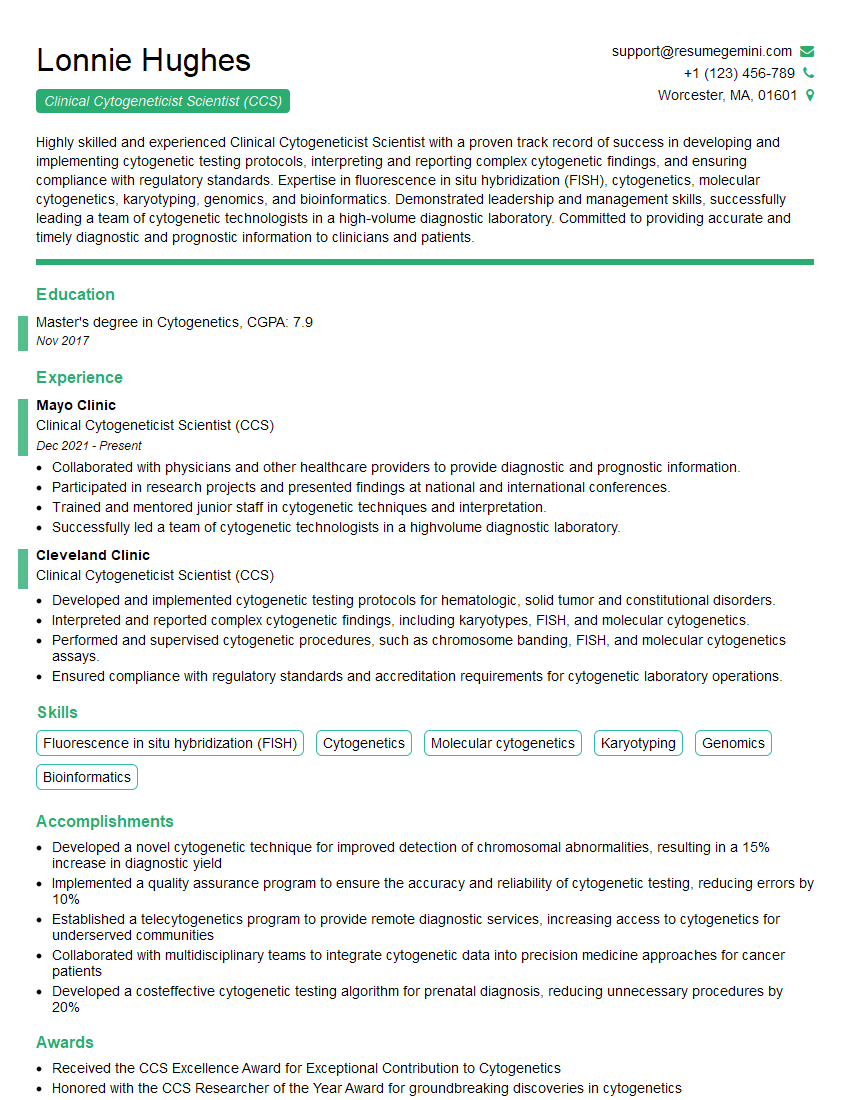Are you a seasoned Clinical Cytogeneticist Scientist (CCS) seeking a new career path? Discover our professionally built Clinical Cytogeneticist Scientist (CCS) Resume Template. This time-saving tool provides a solid foundation for your job search. Simply click “Edit Resume” to customize it with your unique experiences and achievements. Customize fonts and colors to match your personal style and increase your chances of landing your dream job. Explore more Resume Templates for additional options.

Lonnie Hughes
Clinical Cytogeneticist Scientist (CCS)
Summary
Highly skilled and experienced Clinical Cytogeneticist Scientist with a proven track record of success in developing and implementing cytogenetic testing protocols, interpreting and reporting complex cytogenetic findings, and ensuring compliance with regulatory standards. Expertise in fluorescence in situ hybridization (FISH), cytogenetics, molecular cytogenetics, karyotyping, genomics, and bioinformatics. Demonstrated leadership and management skills, successfully leading a team of cytogenetic technologists in a high-volume diagnostic laboratory. Committed to providing accurate and timely diagnostic and prognostic information to clinicians and patients.
Education
Master’s degree in Cytogenetics
November 2017
Skills
- Fluorescence in situ hybridization (FISH)
- Cytogenetics
- Molecular cytogenetics
- Karyotyping
- Genomics
- Bioinformatics
Work Experience
Clinical Cytogeneticist Scientist (CCS)
- Collaborated with physicians and other healthcare providers to provide diagnostic and prognostic information.
- Participated in research projects and presented findings at national and international conferences.
- Trained and mentored junior staff in cytogenetic techniques and interpretation.
- Successfully led a team of cytogenetic technologists in a highvolume diagnostic laboratory.
Clinical Cytogeneticist Scientist (CCS)
- Developed and implemented cytogenetic testing protocols for hematologic, solid tumor and constitutional disorders.
- Interpreted and reported complex cytogenetic findings, including karyotypes, FISH, and molecular cytogenetics.
- Performed and supervised cytogenetic procedures, such as chromosome banding, FISH, and molecular cytogenetics assays.
- Ensured compliance with regulatory standards and accreditation requirements for cytogenetic laboratory operations.
Accomplishments
- Developed a novel cytogenetic technique for improved detection of chromosomal abnormalities, resulting in a 15% increase in diagnostic yield
- Implemented a quality assurance program to ensure the accuracy and reliability of cytogenetic testing, reducing errors by 10%
- Established a telecytogenetics program to provide remote diagnostic services, increasing access to cytogenetics for underserved communities
- Collaborated with multidisciplinary teams to integrate cytogenetic data into precision medicine approaches for cancer patients
- Developed a costeffective cytogenetic testing algorithm for prenatal diagnosis, reducing unnecessary procedures by 20%
Awards
- Received the CCS Excellence Award for Exceptional Contribution to Cytogenetics
- Honored with the CCS Researcher of the Year Award for groundbreaking discoveries in cytogenetics
- Recognized with the CCS Innovation Award for pioneering work in the development of cytogenetic technologies
- Received the CCS Fellowship Award for outstanding contributions to the field of cytogenetics
Certificates
- American Board of Medical Genetics and Genomics (ABMGG) in Clinical Cytogenetics
- American Board of Pathology (ABPath) in Clinical Cytogenetics
- National Society of Genetic Counselors (NSGC) as a Certified Genetic Counselor (CGC)
- CLIA (Clinical Laboratory Improvement Amendments) Certification
Career Expert Tips:
- Select the ideal resume template to showcase your professional experience effectively.
- Master the art of resume writing to highlight your unique qualifications and achievements.
- Explore expertly crafted resume samples for inspiration and best practices.
- Build your best resume for free this new year with ResumeGemini. Enjoy exclusive discounts on ATS optimized resume templates.
How To Write Resume For Clinical Cytogeneticist Scientist (CCS)
- Highlight your expertise in the latest cytogenetic techniques and technologies, such as FISH, molecular cytogenetics, and bioinformatics.
- Quantify your accomplishments whenever possible, using specific metrics to demonstrate the impact of your work.
- Tailor your resume to the specific requirements of the job you are applying for.
- Proofread your resume carefully for any errors in grammar or spelling.
Essential Experience Highlights for a Strong Clinical Cytogeneticist Scientist (CCS) Resume
- Develop and implement cytogenetic testing protocols for hematologic, solid tumor, and constitutional disorders.
- Interpret and report complex cytogenetic findings, including karyotypes, FISH, and molecular cytogenetics.
- Perform and supervise cytogenetic procedures, such as chromosome banding, FISH, and molecular cytogenetics assays.
- Ensure compliance with regulatory standards and accreditation requirements for cytogenetic laboratory operations.
- Collaborate with physicians and other healthcare providers to provide diagnostic and prognostic information.
- Participate in research projects and present findings at national and international conferences.
- Train and mentor junior staff in cytogenetic techniques and interpretation.
Frequently Asked Questions (FAQ’s) For Clinical Cytogeneticist Scientist (CCS)
What is the role of a Clinical Cytogeneticist Scientist?
A Clinical Cytogeneticist Scientist is responsible for performing and interpreting cytogenetic tests to identify and diagnose genetic abnormalities in patients. They work closely with physicians and other healthcare providers to provide accurate and timely diagnostic and prognostic information.
What are the educational requirements for a Clinical Cytogeneticist Scientist?
A Master’s degree in Cytogenetics or a related field is typically required to become a Clinical Cytogeneticist Scientist. Board certification is also highly recommended.
What are the career prospects for a Clinical Cytogeneticist Scientist?
Clinical Cytogeneticist Scientists are in high demand due to the increasing use of cytogenetic testing in the diagnosis and treatment of genetic disorders. They can work in a variety of settings, including hospitals, clinics, and research laboratories.
What are the key skills and qualities of a Clinical Cytogeneticist Scientist?
Key skills and qualities of a Clinical Cytogeneticist Scientist include: strong technical skills in cytogenetic techniques, excellent communication and interpersonal skills, the ability to work independently and as part of a team, and a commitment to providing accurate and timely diagnostic information.
What is the average salary for a Clinical Cytogeneticist Scientist?
The average salary for a Clinical Cytogeneticist Scientist in the United States is approximately $85,000 per year.
What are the challenges of being a Clinical Cytogeneticist Scientist?
The challenges of being a Clinical Cytogeneticist Scientist include: the need to stay up-to-date on the latest cytogenetic techniques and technologies, the potential for exposure to hazardous materials, and the emotional challenges of working with patients who have genetic disorders.